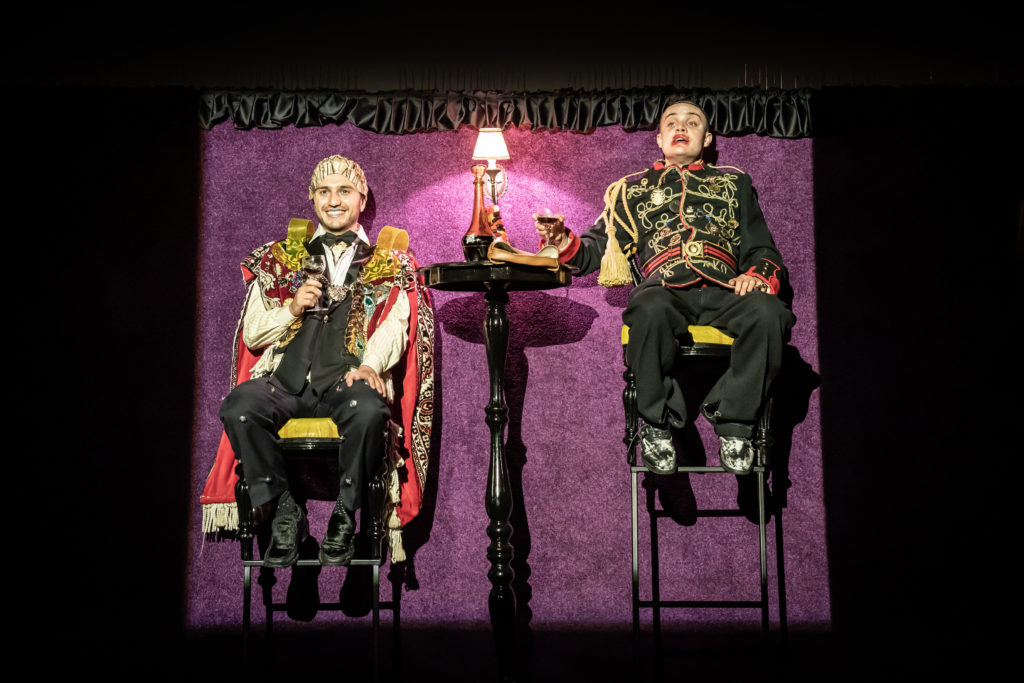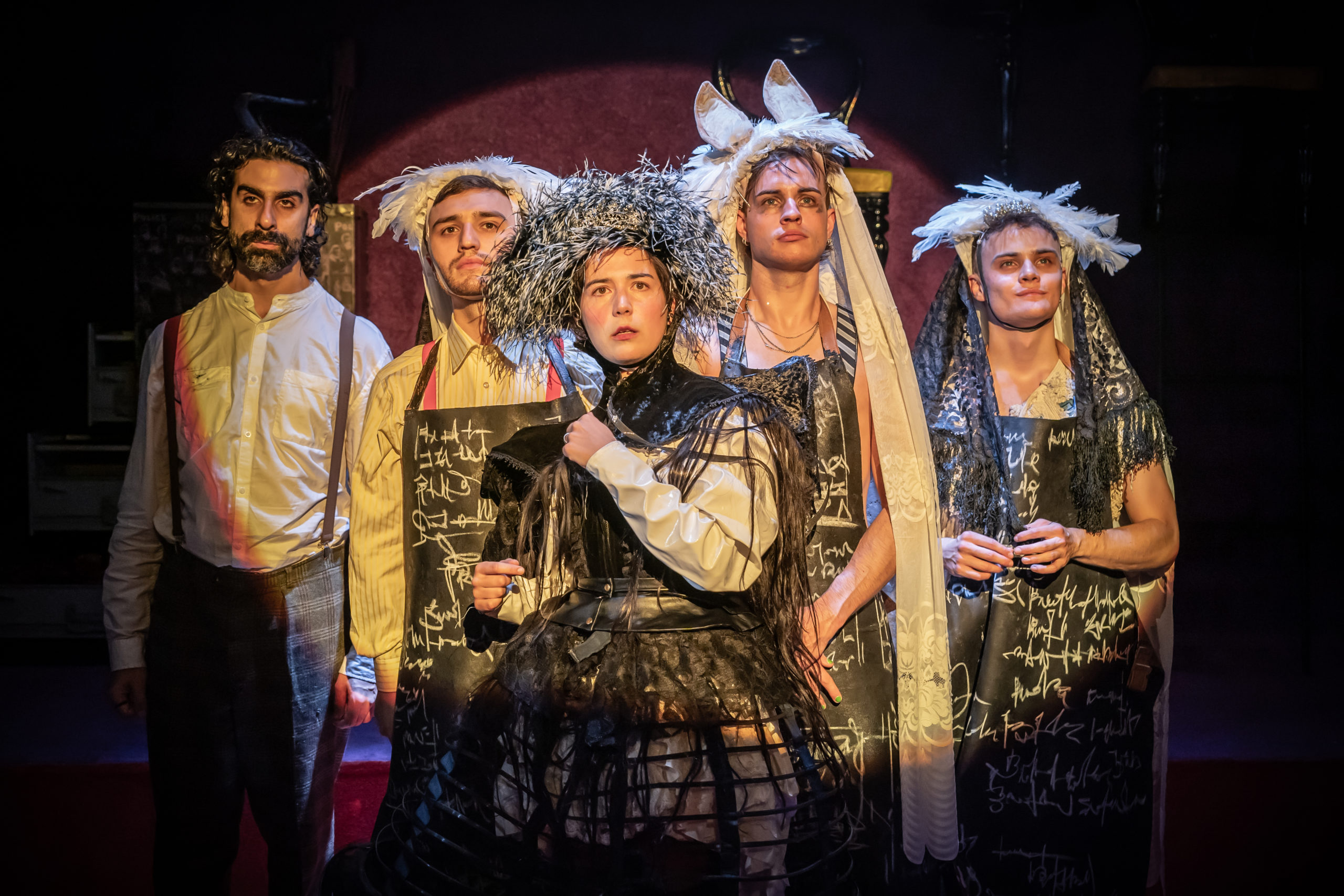The Flea – The Yard Theatre, London
A clever little story about a very Victorian scandal, The Flea shows just what an impact something seemingly insignificant can have.

The Flea
Well, which flea? The flea. That started it all. The flea that bit the rat, which spooked a horse, which kicked a man, which… so on and so on. OK, not a literal flea. But the catalyst for a butterfly effect. In this case, a scandal which had an impact on many lives, and eventually the whole country.
The Flea, by James Fritz, tells the story of the Cleveland Street scandal. Not heard if it? Neither had I. But it’s a good one. Picture Bermondsey, 1899. A young man, Charlie Swinscow, a simple telegraph boy, is arrested on charges of theft. He had the money, too much for a boy in his position. Surely he did it. Only he didn’t: he earned that money fair and square. Just not legally, especially after the “Labouchère Amendment” had made it easier to bring prosecution for suspected acts of homosexuality just a few years earlier. For some reason, however, (belief his place of employment is above the law?) Swinscowe happily tells the police he made the money at his second job. At a very exclusive brother in Fitzrovia staffed with fellow postal employees.
It’s the type of scandal where everything is vague rumours and murmurings. What does seem to be clear is that there was a brothel with wealthy and influential patrons, and some sort of agreement that the police would turn a blind eye. Rumours flew about who was implicated, going all the way to the top: Lord Arthur Somerset. Henry James FitzRoy, Earl of Euston. Prince Albert Victor, known to his friends as Eddy. Was that true, or just a means to try to force the police to drop the investigation all together? You and I will never know now, although someone somewhere does. What a to-do.

Understanding Human Nature
James Fritz takes this nebulous beginning and crafts from it a brilliant piece of theatre. The Flea is wildly funny, with well-developed characters, and cutting social commentary. Director Jay Miller dials it up even further in a production which is surreally bonkers, energetic, and hits every note perfectly.
That this is a special production is clear from the outset. I don’t think I’ve seen another with opening credits, for a start. But it works brilliantly well with five actors taking on multiple roles, from poor old Charlie Swinscow and his mother to policemen, brothel clientele, and members of the royal family. The story then begins, with Fritz boldly filling the gaps between hearsay and rumour. As the opening credits proclaim some of this happened and some of it definitely, definitely didn’t. Just as well none of those involved are around any longer: the Victorians loved a libel trial. There’s even a Jack the Ripper subplot for those who love their Victoriana, and a line of truly brilliant religious commentary which I won’t ruin for you any further.
What Fritz also does very well is understand human nature. The characters and their motivations are all very different. Some are sympathetic, some less so. Most have their moments where we as the audience can at least empathise with them. But when push comes to shove, every single person acts in their own best interest. Just like the tale of the flea and the rat and the horse (well actually including the flea and the rat and the horse who also acted in their best interest), this sets off a chain of events which escalates far beyond any one person’s intentions. It’s like a mirror to our darker selves and baser instincts of self-preservation.
Perhaps the one unresolved tension in the play also comes from this focus on individual motives. On the one hand, you see, there is a very clear understanding that the young postal workers caught up in the scandal were pushed into a compromising situation by the lack of safety net in Victorian society. With so many living on a knife-edge between making ends meet and penury, you do what you have to.
The flip side of this is that the patrons took advantage of desperation for their own pleasure. It chimes with the Victorian view that homosexuality was mainly an aristocratic vice perverting young men. And yet, conversations between the aristocratic characters show them as people just trying to live happy lives in peace and quiet, against the odds. On second thoughts, is it an unresolved tension, or an accurate reflection of the complexity and unfairness of the situation for all involved?

A Note On Performances And Design
Let us take a moment to talk about the performances. I thought all of the actors were excellent. Norah Lopez Holden is the backbone of the production as Emily Swinscow and Queen Victoria, with a sort of Dickensian narrator role thrown in. Her petulant queen and world-weary Emily are the two ends of the Victorian spectrum, while her comic timing is excellent. Séamus McClean Ross plays her son Charlie (with perhaps the cleanest motives of the bunch), and does a very whimsical turn as Queen Victoria’s notoriously naughty son Bertie.
Connor Finch and Sonny Poon Tip both show great range, playing the aristocrats caught up in the scandal as well as a keen young policeman and cynical brothel recruiter. Each is perhaps slightly stronger in one role, but all characters have their moment. Finally Scott Karim plays the tough guys: the brothel owner and the down on his luck policeman. Oh, and God. As the policeman on his way to being fired he avoids falling into the clichés of endless cops of film and television in similar dire straights. All in all, well done to Casting Director Jatinder Chera.
And now please allow me to rave about the costumes (Lambdog1066), hair and make-up (Dominique Hamilton) and set design (Naomi Kuyck-Cohen). Perfection. There’s not strictly any reason in the text for the play to be an avant-garde, Alice-in-Wonderland world of flourishes, furniture on the walls and wonderful wigs. But it works perfectly to set up the absurdity of the situation. I particularly admired Lambdog1066’s costumes. Reading the Cleveland Street scandal Wikipedia page on the way home (as you do), I noticed the costumes have as their inspiration well-known images of the real life subjects, exaggerated to extremes. A very clever touch.
If you haven’t been browsing tickets to The Flea while you’ve been reading, I don’t understand why not. This is a production that shows what is so great about The Yard, a creative, risk-taking space which aims to reimagine theatre entirely. Go early to enjoy a drink and a bite to eat at the theatre or nearby businesses in Queen’s Yard.
Salterton Arts Review’s rating: 4.5/5
The Flea on until 18 November 2023
If you see this after your page is loaded completely, leafletJS files are missing.

